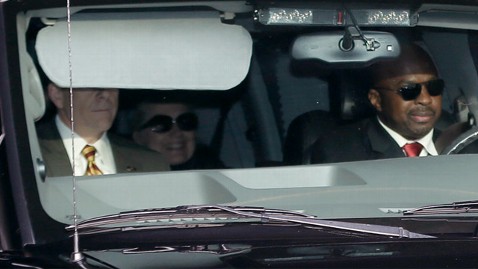CARACAS (Reuters) - Venezuelan lawmakers re-elected a staunch ally of Hugo Chavez to head the National Assembly on Saturday, putting him in line to be caretaker president if the socialist leader does not recover from cancer surgery.
By choosing the incumbent, Diosdado Cabello, the "Chavista"-dominated legislature cemented the combative ex-soldier's position as the third most powerful figure in the government, after Chavez and Vice President Nicolas Maduro.
"As a patriot ... I swear to be supremely loyal in everything I do, to defend the fatherland, its institutions, and this beautiful revolution led by our Comandante Hugo Chavez," Cabello said as he took the oath, his hand on the constitution.
He had earlier warned opposition politicians against attempting to use the National Assembly to "conspire" against the people, saying they would be "destroyed" if they tried.
Thousands of the president's red-clad supporters gathered outside parliament hours before the vote, many chanting: "We are all Chavez! Our comandante will be well! He will return!"
If Chavez had to step down, or died, Cabello would take over the running of the country as Assembly president and a new election would be organized within 30 days. Chavez's heir apparent, Maduro, would be the ruling Socialist Party candidate.
Chavez, who was diagnosed with an undisclosed form of cancer in his pelvic area in mid-2011, has not been seen in public nor heard from in more than three weeks.
Officials say the 58-year-old is in delicate condition and has suffered multiple complications since the December 11 surgery, including unexpected bleeding and severe respiratory problems.
Late on Friday, Maduro gave the clearest indication yet that the government was preparing to delay Chavez's inauguration for a new six-year term, which is scheduled for Thursday.
'CHAVEZ IS PRESIDENT'
Maduro said the ceremony was a "formality" and that Chavez could be sworn in by the Supreme Court at a later date.
The opposition says Chavez's absence would be just the latest sign that he is no longer fit to govern, and that new elections should be held in the South American OPEC nation.
Brandishing a copy of the constitution after his win in the Assembly, Cabello slammed opposition leaders for writing a letter to foreign embassies in which they accused the government of employing a "twisted reading" of the charter.
"Get this into your heads: Hugo Chavez was elected president and he will continue to be president beyond January 10. No one should have any doubt ... this is the constitutional route," he said as fellow Socialist Party lawmakers cheered.
The opposition sat stony-faced. One of their legislators had earlier told the session that it was not just the head of state who was ill, "the republic is sick."
Last year, Chavez staged what appeared to be a remarkable comeback from the disease to win re-election in October, despite being weakened by radiation therapy. He returned to Cuba for more treatment within weeks of his victory.
Should the president have to step down after 14 years in office, a new vote would probably pit Maduro, a 50-year-old former bus driver and union leader, against opposition leader Henrique Capriles, the 40-year-old governor of Miranda state.
Capriles lost to Chavez in October's presidential election.
"I don't think Maduro would last many rounds in a presidential race. He's not fit for the responsibility they have given him," Capriles said after the vice president's appearance on state television.
Chavez's condition is being watched closely by leftist allies around Latin American who have benefited from his oil-funded generosity, as well as investors attracted by Venezuela's lucrative and widely traded debt.
The country boasts the world's biggest crude reserves. Despite the huge political upheaval Chavez's exit would cause, the oil industry is not likely to be affected much in the short term, with an extension of "Chavismo" keeping projects on track, while a change in parties could usher in more foreign capital.
(Additional reporting by Deisy Buitrago; Editing by Vicki Allen)

 WALL STREET 'UNLIKES' FACEBOOK Facebook's looming IPO was the most hyped stock offering of the year, breathless coverage leading up to the big day in mid-May. But when the price of a share was set at $38 - which led to the company being valued over $100bn with revenues of just $3.7bn - the offering flopped. The firm's value fell by 28% and its shares are trading somewhere near $25.
WALL STREET 'UNLIKES' FACEBOOK Facebook's looming IPO was the most hyped stock offering of the year, breathless coverage leading up to the big day in mid-May. But when the price of a share was set at $38 - which led to the company being valued over $100bn with revenues of just $3.7bn - the offering flopped. The firm's value fell by 28% and its shares are trading somewhere near $25. LETTING GO OF THE PAJAMAS After Rahul Dravid and VVS Laxman gracefully hung up their boots this year, attention turned to 39-year-old Sachin Tendulkar. A string of test failures only added to the pressure and after a few months of 'will-he-won't-he', the maestro announced a retirement. Well, kind of. While he may have played this one with soft hands, by quitting ODI arena, many still await big doosra sometime next year.
LETTING GO OF THE PAJAMAS After Rahul Dravid and VVS Laxman gracefully hung up their boots this year, attention turned to 39-year-old Sachin Tendulkar. A string of test failures only added to the pressure and after a few months of 'will-he-won't-he', the maestro announced a retirement. Well, kind of. While he may have played this one with soft hands, by quitting ODI arena, many still await big doosra sometime next year. NO WAY UP FOR THE CONGRESS Over the last few years, the Congress, led by its princeling, Rahul Gandhi, had been telling the world that it was in the process of 'revitalising' itself in UP, its former political karmabhoomi. Rahul and his advisers led protests, staged big rallies and toured the state in the run-up to polls this year. But when the party was handed a drubbing, party leaders scrambled to defend the heir. Heads rolled, chins sagged and the usual infighting broke out, some leaders accusing others of sabotaging the party's grand strategy. Pollsters wondered what strategy they were referring to.
NO WAY UP FOR THE CONGRESS Over the last few years, the Congress, led by its princeling, Rahul Gandhi, had been telling the world that it was in the process of 'revitalising' itself in UP, its former political karmabhoomi. Rahul and his advisers led protests, staged big rallies and toured the state in the run-up to polls this year. But when the party was handed a drubbing, party leaders scrambled to defend the heir. Heads rolled, chins sagged and the usual infighting broke out, some leaders accusing others of sabotaging the party's grand strategy. Pollsters wondered what strategy they were referring to. US ELECTIONS: THE TIE THAT WASN'T In an 'election year' the White House's next occupant was America's big obsession for most of the year. Much of that had to do with every pundit worth his morning decaf mouthing some variation of the line that the race between Mitt Romney and Barack Obama was either "too close to call" or going "right down to the wire". Some predicted a tie, with a messy mixed presidential outcome to follow. In the end, Obama won.
US ELECTIONS: THE TIE THAT WASN'T In an 'election year' the White House's next occupant was America's big obsession for most of the year. Much of that had to do with every pundit worth his morning decaf mouthing some variation of the line that the race between Mitt Romney and Barack Obama was either "too close to call" or going "right down to the wire". Some predicted a tie, with a messy mixed presidential outcome to follow. In the end, Obama won. THE T-WORD For many in Telangana, the centre dithers, it would seem, while AP burns. When the agitation for a separate state gathered momentum towards the end of last year, the home ministry made conciliatory noises and several predicted that 2012 would see the birth of Telangana, with a compromise on the tricky Hyderabad issue. Nothing happened, and as angry protesters break barricades this week, the current HM appears to be making the right kind of noises, again. Now for 2013.
THE T-WORD For many in Telangana, the centre dithers, it would seem, while AP burns. When the agitation for a separate state gathered momentum towards the end of last year, the home ministry made conciliatory noises and several predicted that 2012 would see the birth of Telangana, with a compromise on the tricky Hyderabad issue. Nothing happened, and as angry protesters break barricades this week, the current HM appears to be making the right kind of noises, again. Now for 2013. IT WAS ALL MAYA Like Mark Twain, the world can't get enough of the fact that reports of its death are greatly exaggerated, time and again. Based on some pseudo-scientific twaddle — which apparently revealed the 'discovery' of an ancient Mayan prediction that the world would end when the Mayan calendar 'ran out' on December 21, 2012 — a veritable crescendo of doomsday hype echoed all around the globe this year. It proved to be the year's most irksome non-event.
IT WAS ALL MAYA Like Mark Twain, the world can't get enough of the fact that reports of its death are greatly exaggerated, time and again. Based on some pseudo-scientific twaddle — which apparently revealed the 'discovery' of an ancient Mayan prediction that the world would end when the Mayan calendar 'ran out' on December 21, 2012 — a veritable crescendo of doomsday hype echoed all around the globe this year. It proved to be the year's most irksome non-event. THE AVENGERS DISSEMBLE
THE AVENGERS DISSEMBLE 








